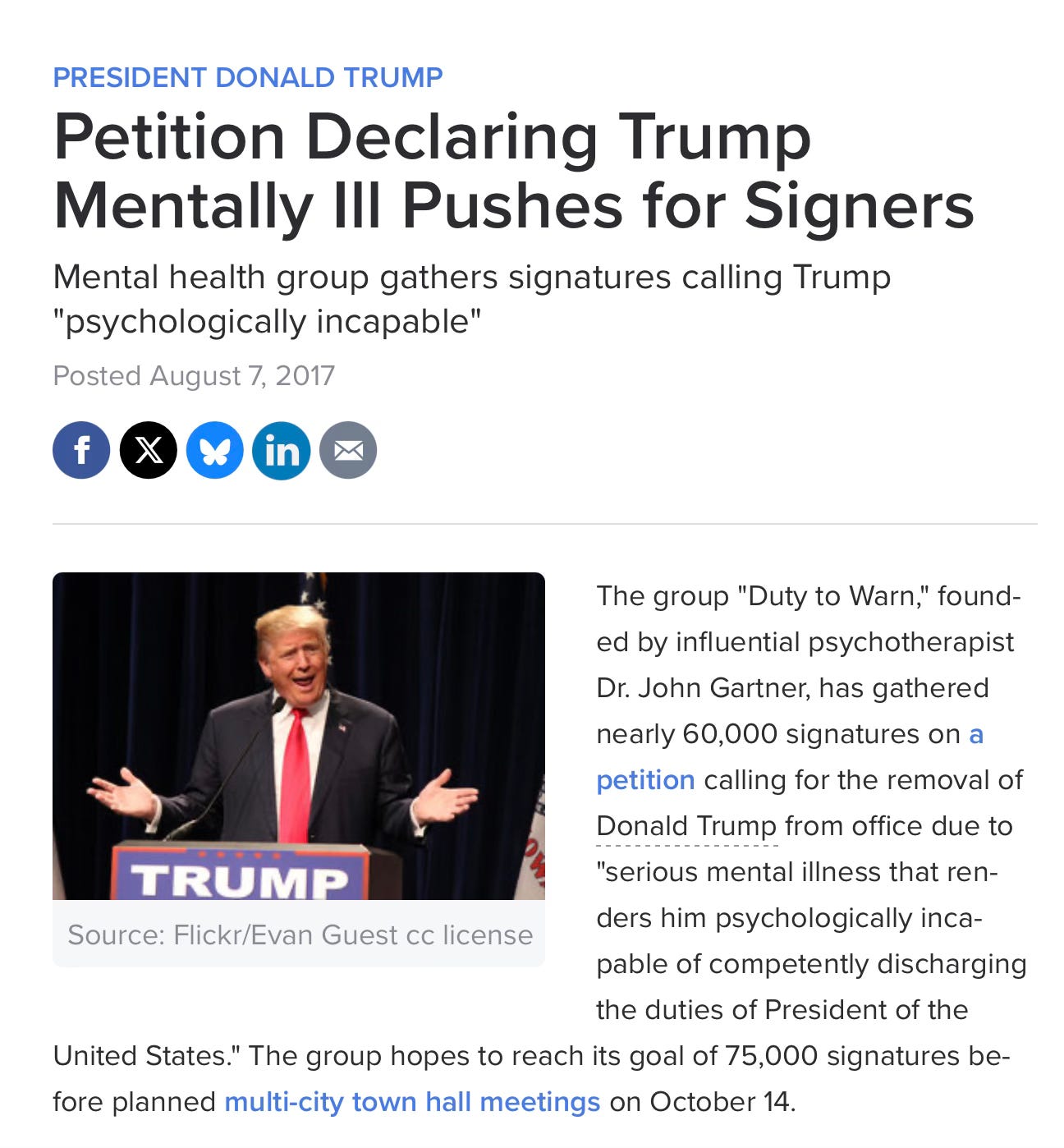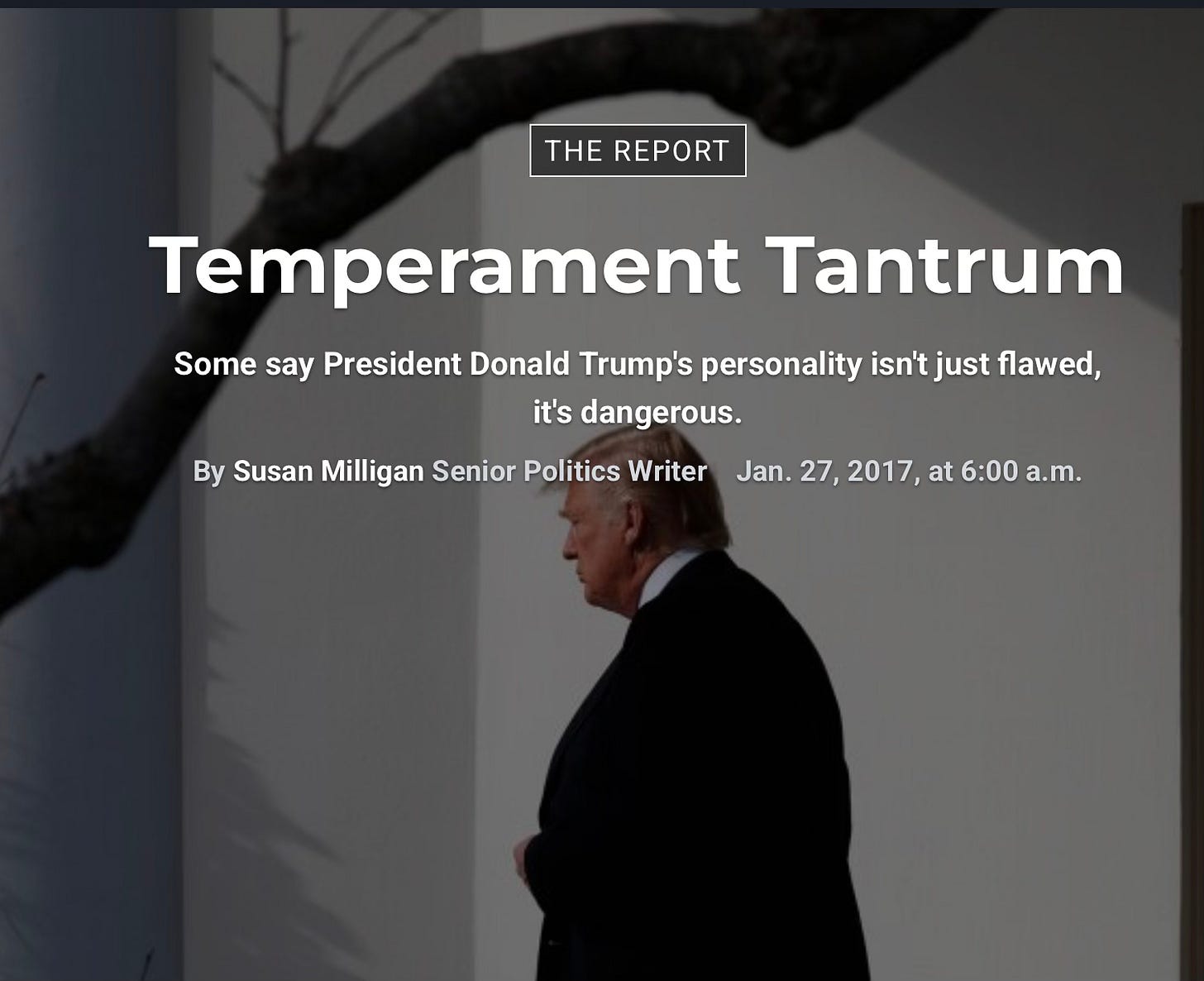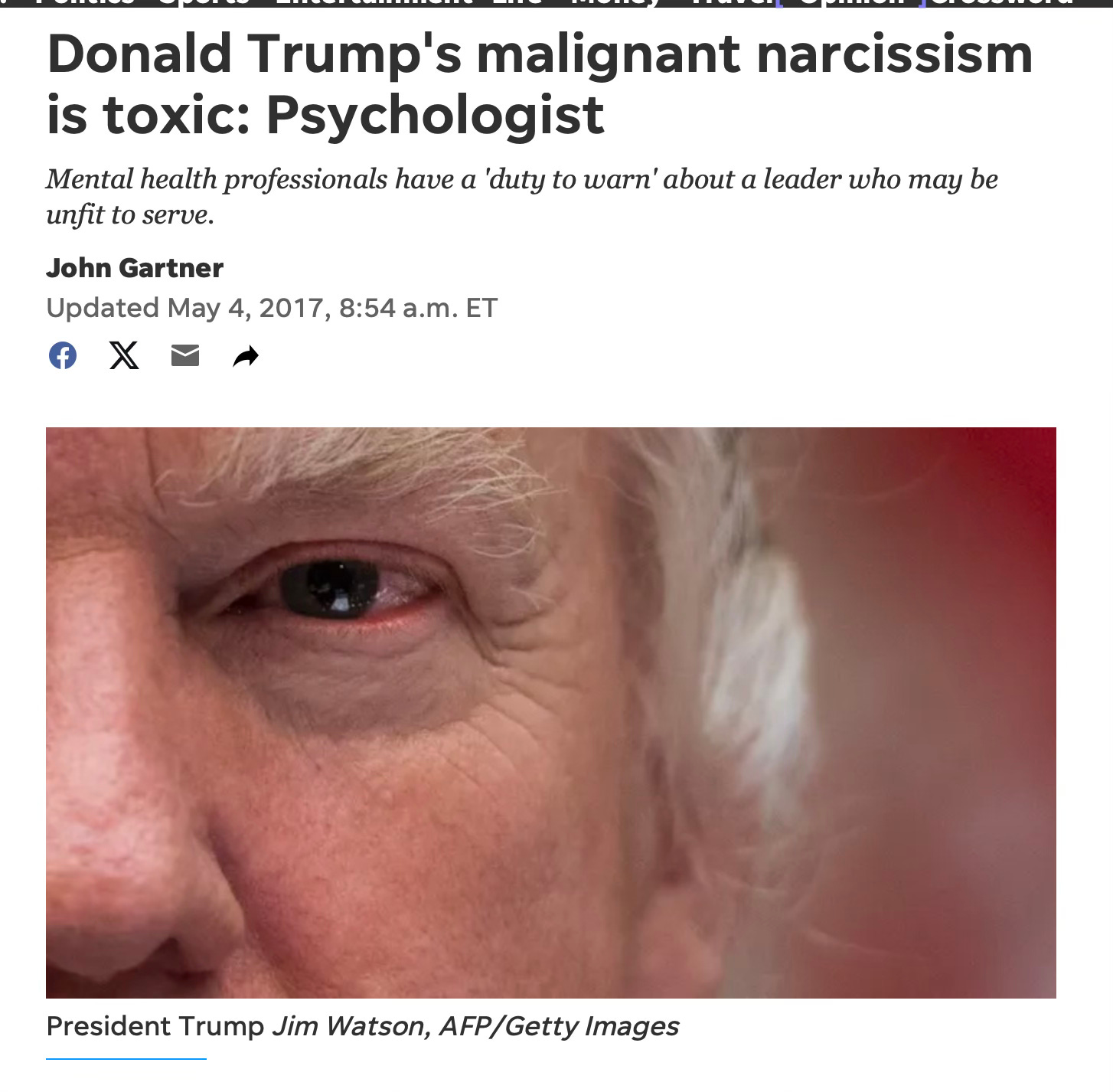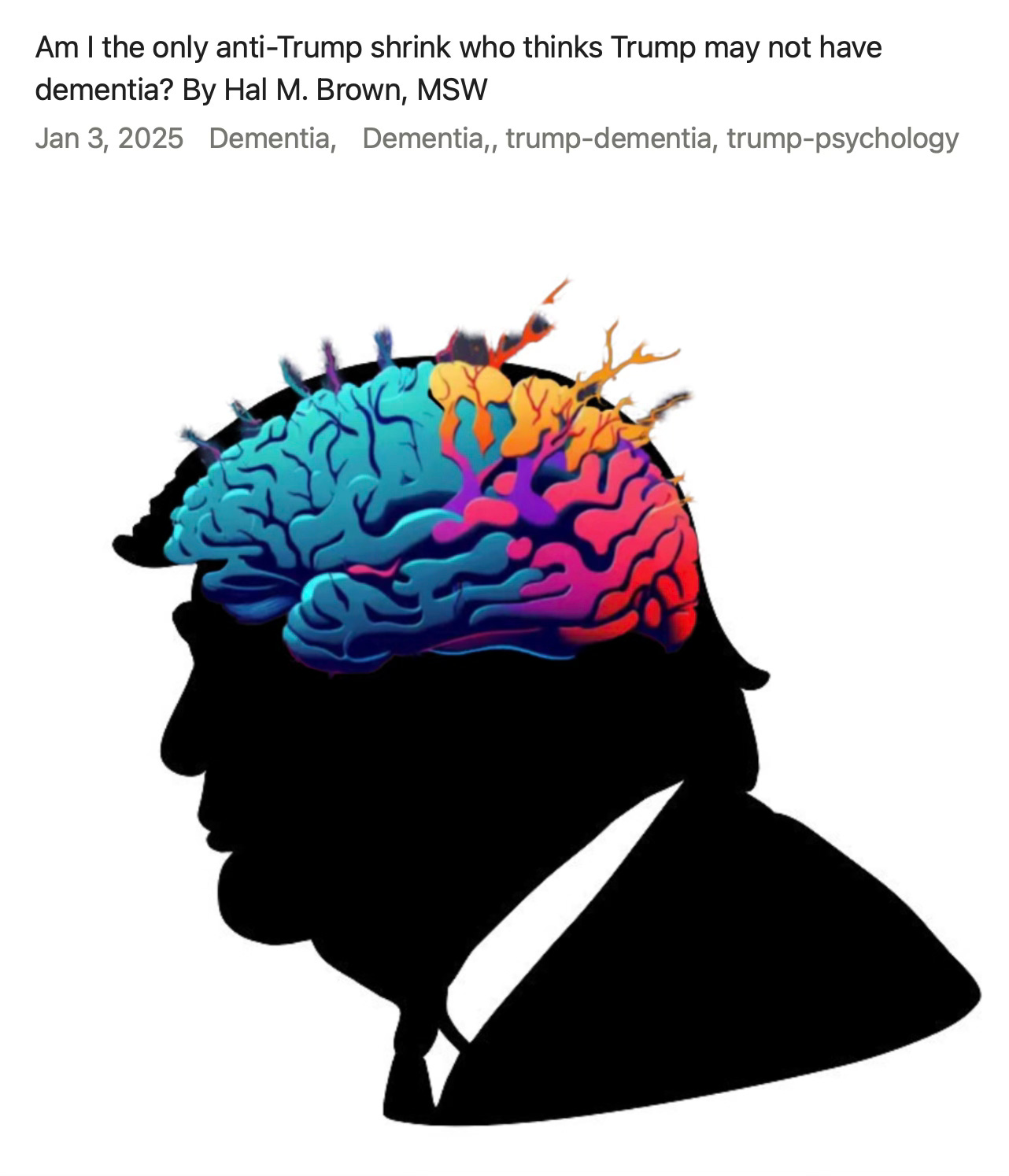As a psychotherapist, retired after 40 yrs. of practice, I only occasionally thought about depth psychology. Then Trump came along as a clear and present danger to democracy in 2017. I was one of the first members of the “Duty to Warn” group started by Dr. John Gartner. In USA Today he wrote “Donald Trump’s malignant narcissism is toxic
He wrote that mental health professionals had a duty to warn about a leader who may be unfit to serve. We look back to say and want to change the phrase “may be unfit to serve” to “manifestly not only unfit to serve but a danger to all things lovers of democracy cherish.”
Duty to Warn went on to become a name for a group he founded. Here’s a Psychology Today article about it:
Like Gartner I began to write about how Trump was a malignant narcissist who was not only unfit to be president but also dangerous to democracy.
In 2018 I wrote a column for Capitol Hill Blue titled “Trump’s sadistic malignant narcissism” I moved from writing there to Daily Kos where I put all my posts about Trump’s psychopathology under the heading Trumpology (you can read them here if you want to torture yourself). I left there (okay, I was kicked off and suspended for life - this is another story), to my publishing my own blog. Then when Substack became popular for political writing I moved there and continued to write many articles about this.
What I wrote in 2018 is so relevant today that I am republishing my Capitol Blue column. (The Doug Thompson Capitol Hill Blue website is still online here.)
Below is my old article with several updates.
I am hearing more and more commentators on MSNBC talk about Trump’s narcissism when they address his self-centered response to the MAGA bomber. (Cesar Sayoc, known as the “MAGA Bomber,” was arrested for sending 16 mail bombs to critics of President Trump in 2018, including prominent figures like Barack Obama and Hillary Clinton. He was sentenced to 20 years in prison for these actions, which were classified as domestic terrorism.) It is true as far as it goes. However, Trump is not a garden variety narcissist.
His narcissism is so extreme that it overrides any awareness that this is a time to at least pretend that he is presidential. His sarcastic dog whistles at his rallies showing his supporters he doesn’t mean what he reads off a teleprompter are proof of this.
Just this morning, when asked by reporters for his response to the Squirrel Hill synagogue murders (The Squirrel Hill synagogue murders refers to the tragic mass shooting that occurred on October 27, 2018, at the Tree of Life – Or L’Simcha Congregation in Pittsburgh, Pennsylvania, where 11 worshippers were killed and several others were injured. This attack is considered the deadliest antisemitic incident in U.S. history, perpetrated by Robert Bowers, who was motivated by hate against the Jewish community. Trump’s rambling unscripted answers show a lack of empathy. He focused on how he thought having an armed guard inside the temple could have prevented any deaths, and how we should have the death penalty for such crimes. He refused to answer questions about gun control and the NRA.
I am sure that what was on Trump’s mind was that he again lost control of a news cycle, and that coverage of this was going to be linked to his inciting his followers to act violently.
Wikipedia explains that “a notable difference between “narcissists” and “malignant narcissists” is the “feature of sadism, or the gratuitous enjoyment of the pain of others. A narcissist will deliberately damage other people in pursuit of their own selfish desires, but may regret it and will in some circumstances show remorse for doing so, while a malignant narcissist will harm others and enjoy doing so, showing little empathy or regret for the damage they have caused.”
Malignant is one of the most frightening words many of us have ever heard. It usually refers to cancer which has spread and may be life-threatening. When the preface malignant is applied to the word narcissism it describes Donald Trump.
Nearly two years ago one of the first mental health professionals to warn about the dangerousness of Donald Trump because of his psychopathology was clinical psychologist John D. Gartner. Over two years ago he started an online petition Mental Health Professionals Declare Trump is Mentally Ill And Must Be Removed which eventually had over 70,000 signatures.
The article had numerous quotes from John Gartner. This was the first mainstream media article to address the alarming situation of having a president so psychologically unfit he represented a grave danger to the nation. Here’s an excerpt:
“Donald Trump is dangerously mentally ill and temperamentally incapable of being president,” says Gartner, author of “In Search of Bill Clinton: A Psychological Biography.” Trump, Gartner says, has “malignant narcissism,” which is different from narcissistic personality disorder and which is incurable.
Gartner acknowledges that he has not personally examined Trump, but says it’s obvious from Trump’s behavior that he meets the diagnostic criteria for the disorder, which include anti-social behavior, sadism, aggressiveness, paranoia and grandiosity. Trump’s personality disorder (which includes hypomania) is also displayed through a lack of impulse control and empathy, and “a feeling that people … don’t recognize their greatness.
“We’ve seen enough public behavior by Donald Trump now that we can make this diagnosis indisputably,” says Gartner.
On May 4, 2017, in USA Today, Gartner had an article published titled “Donald Trump’s malignant narcissism is toxic: Psychologist”
Gartner explains what he means by malignant narcissism.
Much has been written about Trump having narcissistic personality disorder. As critics have pointed out, merely saying a leader is narcissistic is hardly disqualifying. But malignant narcissism is like a malignant tumor: toxic.
Psychoanalyst and Holocaust survivor Erich Fromm, who invented the diagnosis of malignant narcissism, argues that it “lies on the borderline between sanity and insanity.” Otto Kernberg, a psychoanalyst specializing in borderline personalities, defined malignant narcissism as having four components: narcissism, paranoia, antisocial personality and sadism. Trump exhibits all four.
His narcissism is evident in his “grandiose sense of self-importance … without commensurate achievements.” From viewing cable news, he knows “more about ISIS than the generals” and believes that among all human beings on the planet, “I alone can fix it.” His “repeated lying,” “disregard for and violation of the rights of others” (Trump University fraud and multiple sexual assault allegations) and “lack of remorse” meet the clinical criteria for anti-social personality. His bizarre conspiracy theories, false sense of victimization, and demonization of the press, minorities and anyone who opposes him are textbook paranoia. Like most sadists, Trump has been a bully since childhood, and his thousands of vicious tweets make him perhaps the most prolific cyber bully in history.
One of the most aptly titled books about the psychopathology of Donald Trump was published in the Fall of 2017: The Dangerous Case of Donald Trump.
In 27 essays by mostly mental health professionals, the book explained how Trump was affecting the mental health of the people of the United States, how he put the country at grave risk of involving it in a war and of undermining democracy itself because of his psychopathology.
I think that what “The Art of the Deal” author Tony Schwartz (he is the co-author of “The Art of the Deal,” a book published in 1987 that is credited to Donald Trump. Schwartz has expressed regret about writing the book, stating that he feels it contributed to Trump’s public persona and success) told MSNBC host Ari Melber is part and parcel of Trump’s malignant narcissism:
“Given the time you’ve spent with him, what do you see as his relationship with the specter of violence?” MSNBC anchor Ari Melber asked. “Explain what you understand to be his fascination of violence and the way he’s infused that in his politics.”
“So when I go back to the late 1980s, his obsession were — he had two obsessions, one was with football … and the other boxing,” Schwartz recalled. “He was a huge boxing fan and boxing promoter.”
“He loved black people to commit violence against other black people — while he watched,” he explained.
Schwartz summed up Trump’s view as, “You do the violence, I’ll watch the violence. I wouldn’t go near it because it would terrify me, but I love watching it.”
“Why? Because underneath that is rage,” Schwartz concluded. “This is a man of great rage and the rage is, he’s aggrieved.”
“He’s in the business of being aggrieved, and he’s using that in these 10, 12 days leading up to the midterms in trying to bring it out in all the people that are possibly going to vote on the Republican side in this next phase,” he explained. AlterNet
Added to his malignant narcissism where those so inclined can find examples of every diagnostic criterion are the following other behaviors:
lack of any demonstration of having the ability to empathize
total lack of introspection
history of pleasure touching women’s private parts against their will (clinically called Frotteuristic Disorder)
his pathological lying
his impaired reality testing often to the level of having paranoid beliefs
his lack of verbal impulse control
his reckless ideas (as leaked from White House) stopped before he could act on them
and other characteristics that lead me to suggest he needs a diagnosis of his own.
One can argue about the clinical accuracy or ethics of making a distant diagnosis of a president, however, his behavior this week should dispel any doubt that there is something severely amiss in the psychological functioning of Donald Trump.
——–—
P.M. Update:
On Day Of Mass Shooting, Trump Jokes He Nearly Canceled Speech Due To ‘Bad Hair Day’: Trump made the comment at the Future Farmers of America Convention in Indianapolis.
He recalled for the crowd (at the Future Farmers convention) that earlier in the day, he had been holding a news conference about the mass shooting ― which he referred to as a “very unfortunate news conference” ― when he became drenched from the wind and rain. The elements apparently left his hair looking not exactly the way he likes it.
“I said, ‘Maybe I should cancel this arrangement because I have a bad hair day,’” he told the crowd. “And the bad news ― somebody said, ‘Actually it looks better than it usually does.’”
Though he drew laughter from the crowd, many people found the joke to be in poor taste, given the circumstances. Read some of the social media reaction here.
Recently I wrote about how he met the criteria for being in the Dark Triad. Then I discovered the Dark Tetrad. This adds sadism to the triad of Machiavellianism, being a psychopath and an extreme narcissist. He fits this too.
I wrote this in March: “Sadists ® U.S: Trump and The Dark Tetrad,”
Today Sabrina Haake wrote the following:
Below is the gist of the comment I posted on her Substack:
Of course Trump will ignore the law and relish the use of the military to satisfy his need for power, control, and cruelty --- without getting blood on his hands or taking any personal risk. That is for his soldiers to do whether they are in ICE, Customs and Border Patrol, the National Guard, or the active service currently murdering people on boats.
If they have guns Trump will make them part of his combined Gestapo/SS. As long as they obey illegal orders he will be able to use them to enforce his brutal will and forward his diabolical agenda.
Yesterday I wrote “Half the country has a moral compass and thinks that Trump is the worst president in history. Half have no moral compass and think he is the greatest.”
Today I ask whether those in the country who have lost their moral compass - or never even had one - want us to be the kind of country Trump and his associates want it to be.
.















